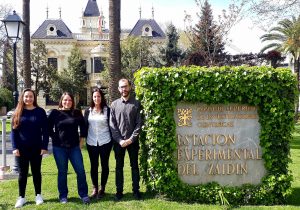Señalización celular y producción de antibióticos en fitobacterias
Miguel Ángel Matilla Vázquez. miguel.matilla@eez.csic.es
Estación Experimental del Zaidín (CSIC – Granada)
Línea de investigación en el contexto de la Microbiología de Plantas.
El grupo del Dr. Miguel A. Matilla en el Departamento de Protección Ambiental de la Estación Experimental del Zaidín investiga los mecanismos moleculares mediante los que las bacterias asociadas a plantas promueven el crecimiento vegetal y protegen frente a fitopatógenos. Asimismo, sus investigaciones también exploran los mecanismos que participan en la colonización de superficies vegetales por bacterias beneficiosas y fitopatógenas. En particular, y mediante el empleo de aproximaciones multidisciplinares, el laboratorio del Dr. Matilla está centrado en el estudio de la biosíntesis y regulación de la producción de antibióticos por fitobacterias, incluyendo metabolitos bioactivos frente a bacterias, hongos y oomicetos fitopatógenos. Asimismo, sus estudios analizan los mecanismos implicados en la interacción planta-bacteria y el papel de diversas señales derivadas de plantas en la modulación de la producción de antibióticos, formación de biopelículas y motilidad bacteriana. De especial interés para el grupo del Dr. Matilla resulta el estudio de las respuestas quimiotácticas en diferentes modelos bacterianos que incluyen promotores del crecimiento, agentes de biocontrol y fitopatógenos. En su conjunto, las investigaciones del grupo están enfocadas a avanzar en el desarrollo de nuevas estrategias para el control racional de enfermedades vegetales.

Componentes (de izquierda a derecha): Laura Monge, Miriam Rico, Alicia García y Miguel Matilla.
https://publons.com/researcher/1261545/miguel-a-matilla/
https://www.eez.csic.es/es/microbiologia-ambiental-y-biodegradacion
Publicaciones
Matilla, M.A., Stöckmann, H., Leeper, F.J., Salmond, G.P.C. (2012) Bacterial biosynthetic gene clusters encoding the anti-cancer haterumalide class of molecules: biogenesis of the broad spectrum antifungal and anti-oomycete compound, oocydin A. The Journal of Biological Chemistry 287:39125-38.
Matilla, M.A., Fang, X, Salmond, G. P.C. (2014) Viunalikeviruses are environmentally common agents of horizontal gene transfer in pathogens and biocontrol bacteria. ISME Journal 8: 2143–2147.
Matilla, M.A., and Salmond, G.P.C. (2014) Bacteriophage ϕMAM1, a Viunalikevirus, is a broad-host-range, high-efficiency generalized transducer that infects environmental and clinical isolates of the enterobacterial genera Serratia and Kluyvera. Applied and Environmental Microbiology 80:6446-6457.
Hellberg, J.E.E.U., Matilla, M.A.*, and Salmond, G.P.C.* (2015) The broad-spectrum antibiotic, zeamine, kills the nematode worm Caenorhabditis elegans. Frontiers in Microbiology 6:137. *Corresponding authors.
Matilla, M.A., Leeper, F.J., Salmond, G.P.C. (2015) Biosynthesis of the antifungal haterumalide, oocydin A, in Serratia, and its regulation by quorum sensing, RpoS and Hfq. Environmental Microbiology 17:2993–3008.
Matilla, M.A.*, Nogellova, V., Morel, B., Krell, , and Salmond, G.P.C.* (2016) Biosynthesis of the acetyl-CoA carboxylase-inhibiting antibiotic, andrimid, in Serratia is regulated by Hfq and the LysR-type transcriptional regulator, AdmX. Environmental Microbiology 18: 3635–3650. *Corresponding authors.
Matilla, M.A. and Krell, T. (2017) Chemoreceptor based signal sensing. Current Opinion in Biotechnology 45:8-14. *(Plus Front Cover of Journal)
Martín-Mora, D., Ortega, A., Pérez-Maldonado, F. J., Krell, T., Matilla, M.A.* (2018) The activity of the C4-dicarboxylic acid chemoreceptor of Pseudomonas aeruginosa is controlled by chemoattractants and antagonists. Scientific reports 8: *Corresponding author.
Gavira, J.A., Ortega, A., Martín-Mora, D., Conejero-Muriel, M.T., Corral-Lugo, A., Morel, B., Matilla, M.A., Krell, T.(2018) Structural basis for polyamine binding at the dCACHE domain of the McpU Chemoreceptor from Pseudomonas putida. Journal of Molecular Biology 430: 1950-1963.
Matilla, M.A.*, Daddaoua, A., Chini, A., Morel, B., Krell, T.* (2018) An auxin controls bacterial antibiotics production. Nucleic Acids Research 96: 11229–11238. *Corresponding authors.
Corral-Lugo, A., Matilla, M.A., Martín-Mora, D., Silva-Jiménez, H., Mesa-Torres, N., Kato, J., Hida, A., Oku, S., Conejero-Muriel, M., Gavira, J.A., Krell, (2018) High-affinity chemotaxis to histamine mediated by the TlpQ chemoreceptor of the human pathogen Pseudomonas aeruginosa. mBio 9: e01894-18.
Matilla, M.A. and Krell, T. (2018) The effect of bacterial chemotaxis on host infection and pathogenicity. FEMS Microbiology Reviews 42:fux052. doi: 10.1093/femsre/fux052.
Matilla, M.A. (2018). Metabolic responses of plants upon different plant–pathogen interactions. In: Ahmad, P. and V.P. Singh (Eds.) Plant Metabolites and Regulation under Environmental stress. Elsevier – Academic press, New York. Chapter 10: 195-214. ISBN: https://doi.org/10.1016/B978-0-12-812689-9.00010-8
Matilla, M.A.* and Krell, T. (2018) Plant growth promotion and biocontrol mediated by plant-associated bacteria. In: Egamberdieva, D. and Ahmad, P. (Eds.) Plant microbiome: Stress response. Microorganisms for Sustainability, vol 5. Springer, Singapore. Chapter 3: 45-80. ISBN: 978-981-10-5513-3. https://doi.org/10.1007/978-981-10-5514-0_3. *Corresponding author.
Matilla, M.A. (2018) Shedding light into the mechanisms of formation and resuscitation of persistent bacterial cells. Environmental Microbiology 20:3129-3131.
Lopez-Farfán, D., Reyes-Darias, J.A., Matilla, M.A.*, Krell, T*. (2019) Concentration dependent effect of plant root exudates on the chemosensory systems of Pseudomonas putida Frontiers in Microbiology 10:78. *Corresponding authors
Huertas, M.J. and Matilla, M.A.* (2020) Training bacteria to produce environmentally friendly polymers of industrial and medical relevance. Microbial Biotechnology 13: 14-16. *Corresponding author.
Cerna-Vargas, J.P., Santamaría-Hernando, S., Matilla, M.A., Rodríguez-Herva, J.J., Daddaoua, A., Rodríguez-Palenzuela, P., Krell, , and López-Solanilla, E. (2019) Chemoperception of specific amino acids controls phytopathogenicity in Pseudomonas syringae pv. tomato. mBio 10: e01868-19.
Molina-Santiago, C. and Matilla, M.A.* (2020) Chemical fertilization: a short-term solution for plant productivity? Microbial Biotechnology 13: 1311-1313. *Corresponding author.
Gavira, J.A., Gumerov, V., Rico-Jiménez, M., Petukh, M., Upadhyay, A., Ortega, A., Matilla, M.A., Zhulin, I., Krell, T. (2020) How bacterial chemoreceptors evolve novel ligand specificities. mBio 11:e03066-19. *mBio Editor´s pick.
Matilla, M.A., Martín-Mora, D., Krell, T. (2020) The use of Isothermal Titration Calorimetry to unravel chemotactic signaling mechanisms. Environmental Microbiology 22: 3005-3019.
Udaondo, Z., Matilla, M.A.* (2020) Mining for novel antibiotics in the age of antimicrobial resistance. Microbial Biotechnology 13: 1702-1704. *Corresponding author.
Jose A. Gavira*, Miguel A. Matilla*, Matilde Fernández, Tino Krell (2020) The structural basis for signal promiscuity in a bacterial chemoreceptor. The FEBS Journal. In press. * Both authors contributed equally to this work.
Félix Velando, José A. Gavira, Miriam Rico-Jiménez, Miguel A. Matilla* and Tino Krell* (2020) Evidence for pentapeptide dependent and independent CheB methylesterases. International Journal of Molecular Sciences 21: 8459. *Corresponding authors.
Miguel A. Matilla, David Martín-Mora, Jose A. Gavira and Tino Krell (2021) Pseudomonas aeruginosa as a model to study chemosensory pathway signalling. Microbiology and Molecular Biology Reviews 85:e00151-20.
Miguel A. Matilla, Álvaro Ortega, Tino Krell (2021) The role of solute binding proteins in signal transduction. Computational and Structural Biotechnology Journal. In press. https://doi.org/10.1016/j.csbj.2021.03.029
